Analyzing Digital Marketing's Impact on Sales Turnover at Marriott
VerifiedAdded on 2023/01/05
|34
|8231
|82
Report
AI Summary
This report investigates the influence of digital marketing campaigns on sales turnover within the UK hospitality industry, specifically focusing on Marriott Hotels. It begins with an introduction outlining the significance of digital marketing in the modern hospitality landscape, followed by a literature review that explores the concept of digital marketing, its emergence, and its impact on sales and revenue, along with the challenges and barriers faced in implementation. The research methodology is then presented, detailing the approach used to gather and analyze data. The data analysis section examines the findings related to the impact of digital marketing on Marriott Hotels' sales, including consumer perceptions and the relationship between marketing strategies and revenue. The report concludes with recommendations for improving digital marketing strategies based on the identified challenges, along with references and appendices to support the findings. The study aims to provide insights for stakeholders, including marketing and finance departments, senior management, and investors, on the direct correlation between digital marketing and sales turnover.
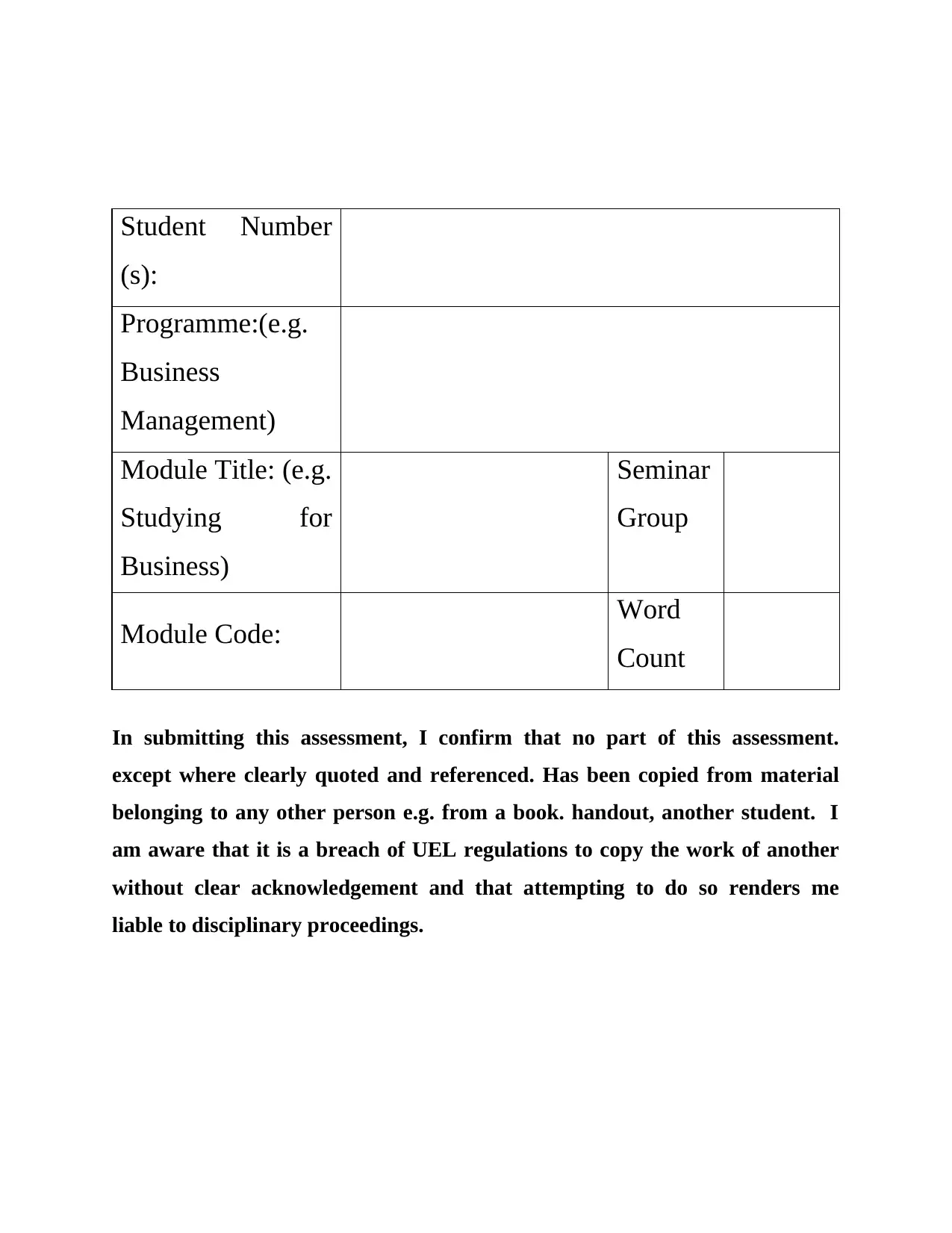
Student Number
(s):
Programme:(e.g.
Business
Management)
Module Title: (e.g.
Studying for
Business)
Seminar
Group
Module Code: Word
Count
In submitting this assessment, I confirm that no part of this assessment.
except where clearly quoted and referenced. Has been copied from material
belonging to any other person e.g. from a book. handout, another student. I
am aware that it is a breach of UEL regulations to copy the work of another
without clear acknowledgement and that attempting to do so renders me
liable to disciplinary proceedings.
(s):
Programme:(e.g.
Business
Management)
Module Title: (e.g.
Studying for
Business)
Seminar
Group
Module Code: Word
Count
In submitting this assessment, I confirm that no part of this assessment.
except where clearly quoted and referenced. Has been copied from material
belonging to any other person e.g. from a book. handout, another student. I
am aware that it is a breach of UEL regulations to copy the work of another
without clear acknowledgement and that attempting to do so renders me
liable to disciplinary proceedings.
Paraphrase This Document
Need a fresh take? Get an instant paraphrase of this document with our AI Paraphraser
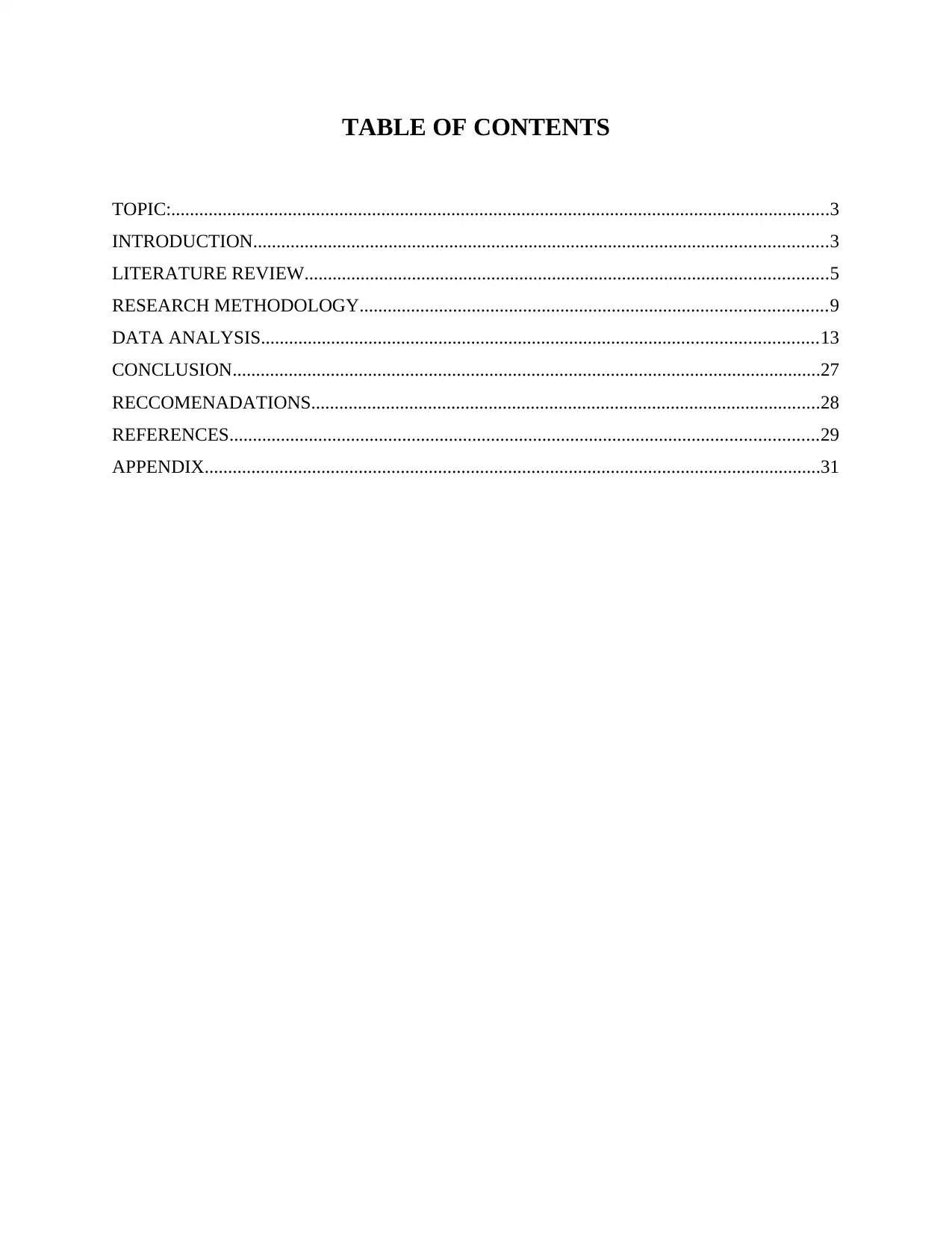
TABLE OF CONTENTS
TOPIC:.............................................................................................................................................3
INTRODUCTION...........................................................................................................................3
LITERATURE REVIEW................................................................................................................5
RESEARCH METHODOLOGY....................................................................................................9
DATA ANALYSIS.......................................................................................................................13
CONCLUSION..............................................................................................................................27
RECCOMENADATIONS.............................................................................................................28
REFERENCES..............................................................................................................................29
APPENDIX....................................................................................................................................31
TOPIC:.............................................................................................................................................3
INTRODUCTION...........................................................................................................................3
LITERATURE REVIEW................................................................................................................5
RESEARCH METHODOLOGY....................................................................................................9
DATA ANALYSIS.......................................................................................................................13
CONCLUSION..............................................................................................................................27
RECCOMENADATIONS.............................................................................................................28
REFERENCES..............................................................................................................................29
APPENDIX....................................................................................................................................31
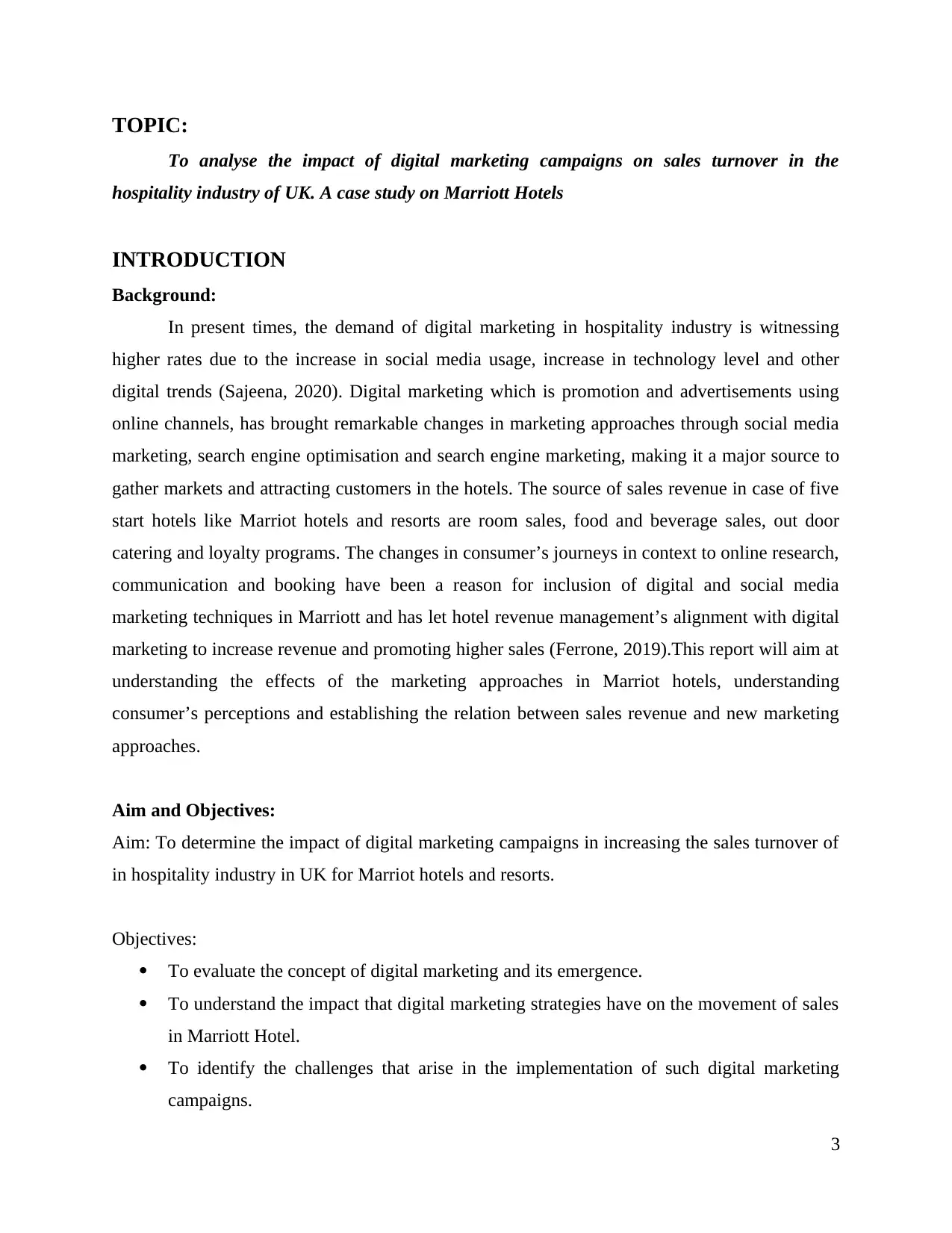
TOPIC:
To analyse the impact of digital marketing campaigns on sales turnover in the
hospitality industry of UK. A case study on Marriott Hotels
INTRODUCTION
Background:
In present times, the demand of digital marketing in hospitality industry is witnessing
higher rates due to the increase in social media usage, increase in technology level and other
digital trends (Sajeena, 2020). Digital marketing which is promotion and advertisements using
online channels, has brought remarkable changes in marketing approaches through social media
marketing, search engine optimisation and search engine marketing, making it a major source to
gather markets and attracting customers in the hotels. The source of sales revenue in case of five
start hotels like Marriot hotels and resorts are room sales, food and beverage sales, out door
catering and loyalty programs. The changes in consumer’s journeys in context to online research,
communication and booking have been a reason for inclusion of digital and social media
marketing techniques in Marriott and has let hotel revenue management’s alignment with digital
marketing to increase revenue and promoting higher sales (Ferrone, 2019).This report will aim at
understanding the effects of the marketing approaches in Marriot hotels, understanding
consumer’s perceptions and establishing the relation between sales revenue and new marketing
approaches.
Aim and Objectives:
Aim: To determine the impact of digital marketing campaigns in increasing the sales turnover of
in hospitality industry in UK for Marriot hotels and resorts.
Objectives:
To evaluate the concept of digital marketing and its emergence.
To understand the impact that digital marketing strategies have on the movement of sales
in Marriott Hotel.
To identify the challenges that arise in the implementation of such digital marketing
campaigns.
3
To analyse the impact of digital marketing campaigns on sales turnover in the
hospitality industry of UK. A case study on Marriott Hotels
INTRODUCTION
Background:
In present times, the demand of digital marketing in hospitality industry is witnessing
higher rates due to the increase in social media usage, increase in technology level and other
digital trends (Sajeena, 2020). Digital marketing which is promotion and advertisements using
online channels, has brought remarkable changes in marketing approaches through social media
marketing, search engine optimisation and search engine marketing, making it a major source to
gather markets and attracting customers in the hotels. The source of sales revenue in case of five
start hotels like Marriot hotels and resorts are room sales, food and beverage sales, out door
catering and loyalty programs. The changes in consumer’s journeys in context to online research,
communication and booking have been a reason for inclusion of digital and social media
marketing techniques in Marriott and has let hotel revenue management’s alignment with digital
marketing to increase revenue and promoting higher sales (Ferrone, 2019).This report will aim at
understanding the effects of the marketing approaches in Marriot hotels, understanding
consumer’s perceptions and establishing the relation between sales revenue and new marketing
approaches.
Aim and Objectives:
Aim: To determine the impact of digital marketing campaigns in increasing the sales turnover of
in hospitality industry in UK for Marriot hotels and resorts.
Objectives:
To evaluate the concept of digital marketing and its emergence.
To understand the impact that digital marketing strategies have on the movement of sales
in Marriott Hotel.
To identify the challenges that arise in the implementation of such digital marketing
campaigns.
3
⊘ This is a preview!⊘
Do you want full access?
Subscribe today to unlock all pages.

Trusted by 1+ million students worldwide
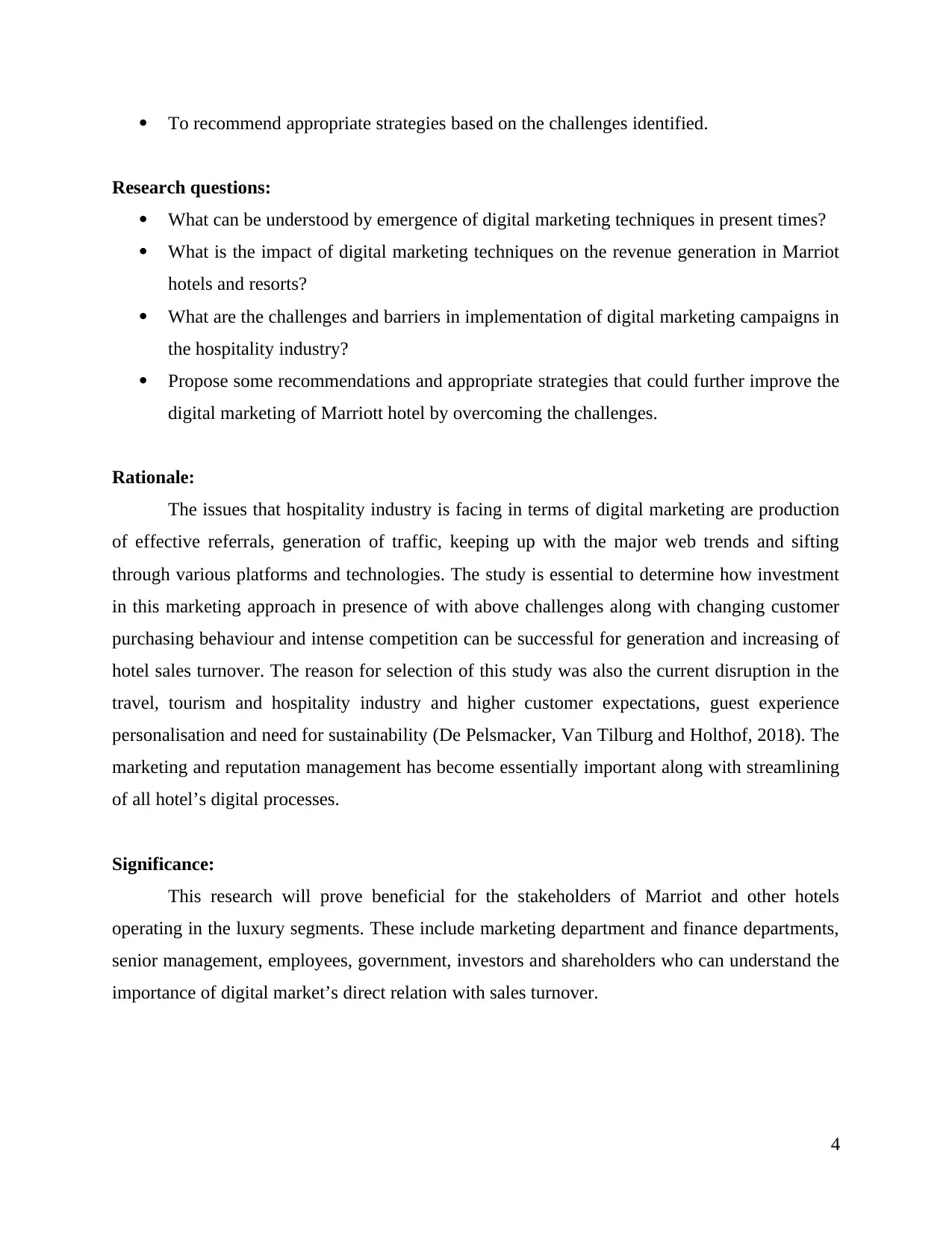
To recommend appropriate strategies based on the challenges identified.
Research questions:
What can be understood by emergence of digital marketing techniques in present times?
What is the impact of digital marketing techniques on the revenue generation in Marriot
hotels and resorts?
What are the challenges and barriers in implementation of digital marketing campaigns in
the hospitality industry?
Propose some recommendations and appropriate strategies that could further improve the
digital marketing of Marriott hotel by overcoming the challenges.
Rationale:
The issues that hospitality industry is facing in terms of digital marketing are production
of effective referrals, generation of traffic, keeping up with the major web trends and sifting
through various platforms and technologies. The study is essential to determine how investment
in this marketing approach in presence of with above challenges along with changing customer
purchasing behaviour and intense competition can be successful for generation and increasing of
hotel sales turnover. The reason for selection of this study was also the current disruption in the
travel, tourism and hospitality industry and higher customer expectations, guest experience
personalisation and need for sustainability (De Pelsmacker, Van Tilburg and Holthof, 2018). The
marketing and reputation management has become essentially important along with streamlining
of all hotel’s digital processes.
Significance:
This research will prove beneficial for the stakeholders of Marriot and other hotels
operating in the luxury segments. These include marketing department and finance departments,
senior management, employees, government, investors and shareholders who can understand the
importance of digital market’s direct relation with sales turnover.
4
Research questions:
What can be understood by emergence of digital marketing techniques in present times?
What is the impact of digital marketing techniques on the revenue generation in Marriot
hotels and resorts?
What are the challenges and barriers in implementation of digital marketing campaigns in
the hospitality industry?
Propose some recommendations and appropriate strategies that could further improve the
digital marketing of Marriott hotel by overcoming the challenges.
Rationale:
The issues that hospitality industry is facing in terms of digital marketing are production
of effective referrals, generation of traffic, keeping up with the major web trends and sifting
through various platforms and technologies. The study is essential to determine how investment
in this marketing approach in presence of with above challenges along with changing customer
purchasing behaviour and intense competition can be successful for generation and increasing of
hotel sales turnover. The reason for selection of this study was also the current disruption in the
travel, tourism and hospitality industry and higher customer expectations, guest experience
personalisation and need for sustainability (De Pelsmacker, Van Tilburg and Holthof, 2018). The
marketing and reputation management has become essentially important along with streamlining
of all hotel’s digital processes.
Significance:
This research will prove beneficial for the stakeholders of Marriot and other hotels
operating in the luxury segments. These include marketing department and finance departments,
senior management, employees, government, investors and shareholders who can understand the
importance of digital market’s direct relation with sales turnover.
4
Paraphrase This Document
Need a fresh take? Get an instant paraphrase of this document with our AI Paraphraser
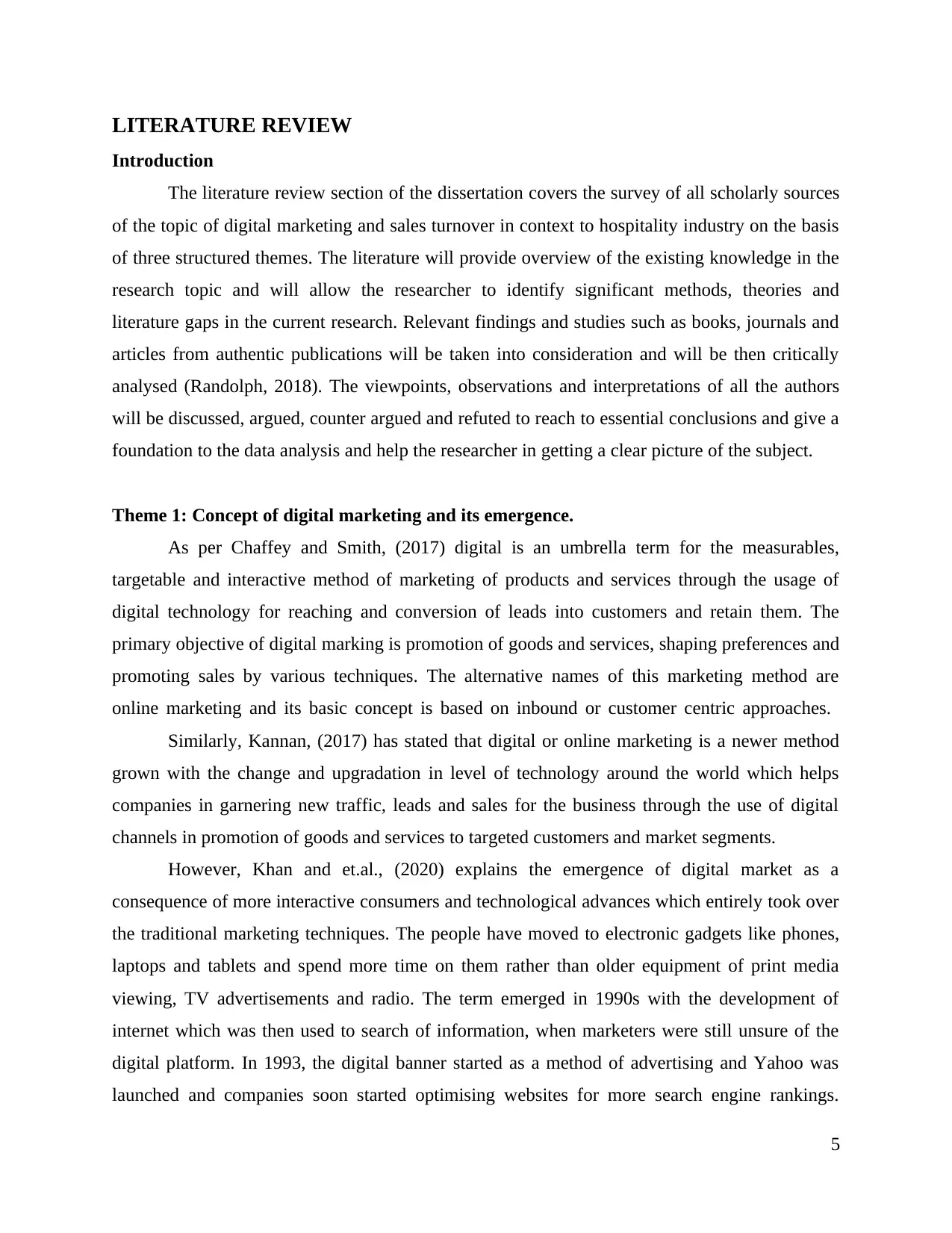
LITERATURE REVIEW
Introduction
The literature review section of the dissertation covers the survey of all scholarly sources
of the topic of digital marketing and sales turnover in context to hospitality industry on the basis
of three structured themes. The literature will provide overview of the existing knowledge in the
research topic and will allow the researcher to identify significant methods, theories and
literature gaps in the current research. Relevant findings and studies such as books, journals and
articles from authentic publications will be taken into consideration and will be then critically
analysed (Randolph, 2018). The viewpoints, observations and interpretations of all the authors
will be discussed, argued, counter argued and refuted to reach to essential conclusions and give a
foundation to the data analysis and help the researcher in getting a clear picture of the subject.
Theme 1: Concept of digital marketing and its emergence.
As per Chaffey and Smith, (2017) digital is an umbrella term for the measurables,
targetable and interactive method of marketing of products and services through the usage of
digital technology for reaching and conversion of leads into customers and retain them. The
primary objective of digital marking is promotion of goods and services, shaping preferences and
promoting sales by various techniques. The alternative names of this marketing method are
online marketing and its basic concept is based on inbound or customer centric approaches.
Similarly, Kannan, (2017) has stated that digital or online marketing is a newer method
grown with the change and upgradation in level of technology around the world which helps
companies in garnering new traffic, leads and sales for the business through the use of digital
channels in promotion of goods and services to targeted customers and market segments.
However, Khan and et.al., (2020) explains the emergence of digital market as a
consequence of more interactive consumers and technological advances which entirely took over
the traditional marketing techniques. The people have moved to electronic gadgets like phones,
laptops and tablets and spend more time on them rather than older equipment of print media
viewing, TV advertisements and radio. The term emerged in 1990s with the development of
internet which was then used to search of information, when marketers were still unsure of the
digital platform. In 1993, the digital banner started as a method of advertising and Yahoo was
launched and companies soon started optimising websites for more search engine rankings.
5
Introduction
The literature review section of the dissertation covers the survey of all scholarly sources
of the topic of digital marketing and sales turnover in context to hospitality industry on the basis
of three structured themes. The literature will provide overview of the existing knowledge in the
research topic and will allow the researcher to identify significant methods, theories and
literature gaps in the current research. Relevant findings and studies such as books, journals and
articles from authentic publications will be taken into consideration and will be then critically
analysed (Randolph, 2018). The viewpoints, observations and interpretations of all the authors
will be discussed, argued, counter argued and refuted to reach to essential conclusions and give a
foundation to the data analysis and help the researcher in getting a clear picture of the subject.
Theme 1: Concept of digital marketing and its emergence.
As per Chaffey and Smith, (2017) digital is an umbrella term for the measurables,
targetable and interactive method of marketing of products and services through the usage of
digital technology for reaching and conversion of leads into customers and retain them. The
primary objective of digital marking is promotion of goods and services, shaping preferences and
promoting sales by various techniques. The alternative names of this marketing method are
online marketing and its basic concept is based on inbound or customer centric approaches.
Similarly, Kannan, (2017) has stated that digital or online marketing is a newer method
grown with the change and upgradation in level of technology around the world which helps
companies in garnering new traffic, leads and sales for the business through the use of digital
channels in promotion of goods and services to targeted customers and market segments.
However, Khan and et.al., (2020) explains the emergence of digital market as a
consequence of more interactive consumers and technological advances which entirely took over
the traditional marketing techniques. The people have moved to electronic gadgets like phones,
laptops and tablets and spend more time on them rather than older equipment of print media
viewing, TV advertisements and radio. The term emerged in 1990s with the development of
internet which was then used to search of information, when marketers were still unsure of the
digital platform. In 1993, the digital banner started as a method of advertising and Yahoo was
launched and companies soon started optimising websites for more search engine rankings.
5
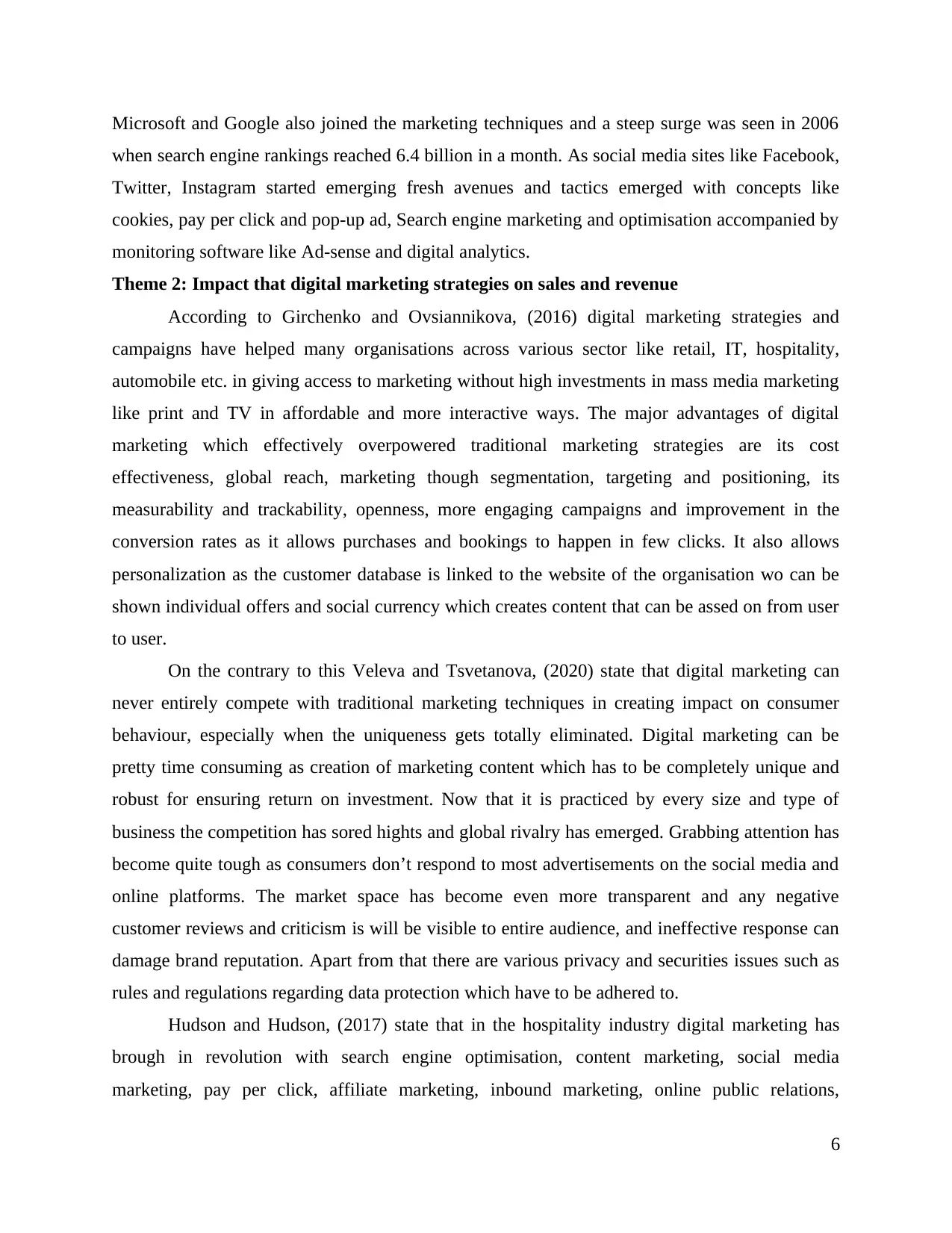
Microsoft and Google also joined the marketing techniques and a steep surge was seen in 2006
when search engine rankings reached 6.4 billion in a month. As social media sites like Facebook,
Twitter, Instagram started emerging fresh avenues and tactics emerged with concepts like
cookies, pay per click and pop-up ad, Search engine marketing and optimisation accompanied by
monitoring software like Ad-sense and digital analytics.
Theme 2: Impact that digital marketing strategies on sales and revenue
According to Girchenko and Ovsiannikova, (2016) digital marketing strategies and
campaigns have helped many organisations across various sector like retail, IT, hospitality,
automobile etc. in giving access to marketing without high investments in mass media marketing
like print and TV in affordable and more interactive ways. The major advantages of digital
marketing which effectively overpowered traditional marketing strategies are its cost
effectiveness, global reach, marketing though segmentation, targeting and positioning, its
measurability and trackability, openness, more engaging campaigns and improvement in the
conversion rates as it allows purchases and bookings to happen in few clicks. It also allows
personalization as the customer database is linked to the website of the organisation wo can be
shown individual offers and social currency which creates content that can be assed on from user
to user.
On the contrary to this Veleva and Tsvetanova, (2020) state that digital marketing can
never entirely compete with traditional marketing techniques in creating impact on consumer
behaviour, especially when the uniqueness gets totally eliminated. Digital marketing can be
pretty time consuming as creation of marketing content which has to be completely unique and
robust for ensuring return on investment. Now that it is practiced by every size and type of
business the competition has sored hights and global rivalry has emerged. Grabbing attention has
become quite tough as consumers don’t respond to most advertisements on the social media and
online platforms. The market space has become even more transparent and any negative
customer reviews and criticism is will be visible to entire audience, and ineffective response can
damage brand reputation. Apart from that there are various privacy and securities issues such as
rules and regulations regarding data protection which have to be adhered to.
Hudson and Hudson, (2017) state that in the hospitality industry digital marketing has
brough in revolution with search engine optimisation, content marketing, social media
marketing, pay per click, affiliate marketing, inbound marketing, online public relations,
6
when search engine rankings reached 6.4 billion in a month. As social media sites like Facebook,
Twitter, Instagram started emerging fresh avenues and tactics emerged with concepts like
cookies, pay per click and pop-up ad, Search engine marketing and optimisation accompanied by
monitoring software like Ad-sense and digital analytics.
Theme 2: Impact that digital marketing strategies on sales and revenue
According to Girchenko and Ovsiannikova, (2016) digital marketing strategies and
campaigns have helped many organisations across various sector like retail, IT, hospitality,
automobile etc. in giving access to marketing without high investments in mass media marketing
like print and TV in affordable and more interactive ways. The major advantages of digital
marketing which effectively overpowered traditional marketing strategies are its cost
effectiveness, global reach, marketing though segmentation, targeting and positioning, its
measurability and trackability, openness, more engaging campaigns and improvement in the
conversion rates as it allows purchases and bookings to happen in few clicks. It also allows
personalization as the customer database is linked to the website of the organisation wo can be
shown individual offers and social currency which creates content that can be assed on from user
to user.
On the contrary to this Veleva and Tsvetanova, (2020) state that digital marketing can
never entirely compete with traditional marketing techniques in creating impact on consumer
behaviour, especially when the uniqueness gets totally eliminated. Digital marketing can be
pretty time consuming as creation of marketing content which has to be completely unique and
robust for ensuring return on investment. Now that it is practiced by every size and type of
business the competition has sored hights and global rivalry has emerged. Grabbing attention has
become quite tough as consumers don’t respond to most advertisements on the social media and
online platforms. The market space has become even more transparent and any negative
customer reviews and criticism is will be visible to entire audience, and ineffective response can
damage brand reputation. Apart from that there are various privacy and securities issues such as
rules and regulations regarding data protection which have to be adhered to.
Hudson and Hudson, (2017) state that in the hospitality industry digital marketing has
brough in revolution with search engine optimisation, content marketing, social media
marketing, pay per click, affiliate marketing, inbound marketing, online public relations,
6
⊘ This is a preview!⊘
Do you want full access?
Subscribe today to unlock all pages.

Trusted by 1+ million students worldwide
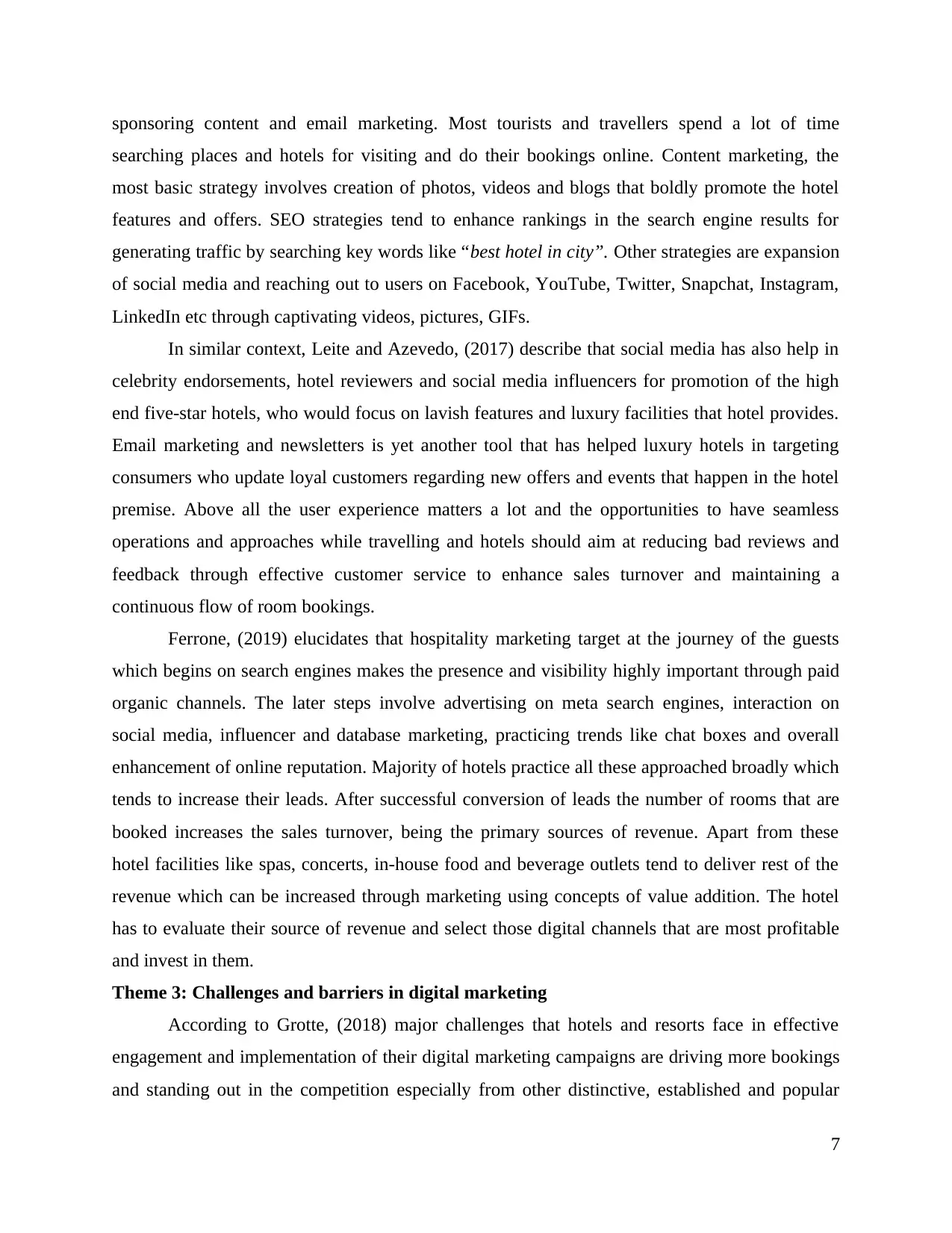
sponsoring content and email marketing. Most tourists and travellers spend a lot of time
searching places and hotels for visiting and do their bookings online. Content marketing, the
most basic strategy involves creation of photos, videos and blogs that boldly promote the hotel
features and offers. SEO strategies tend to enhance rankings in the search engine results for
generating traffic by searching key words like “best hotel in city”. Other strategies are expansion
of social media and reaching out to users on Facebook, YouTube, Twitter, Snapchat, Instagram,
LinkedIn etc through captivating videos, pictures, GIFs.
In similar context, Leite and Azevedo, (2017) describe that social media has also help in
celebrity endorsements, hotel reviewers and social media influencers for promotion of the high
end five-star hotels, who would focus on lavish features and luxury facilities that hotel provides.
Email marketing and newsletters is yet another tool that has helped luxury hotels in targeting
consumers who update loyal customers regarding new offers and events that happen in the hotel
premise. Above all the user experience matters a lot and the opportunities to have seamless
operations and approaches while travelling and hotels should aim at reducing bad reviews and
feedback through effective customer service to enhance sales turnover and maintaining a
continuous flow of room bookings.
Ferrone, (2019) elucidates that hospitality marketing target at the journey of the guests
which begins on search engines makes the presence and visibility highly important through paid
organic channels. The later steps involve advertising on meta search engines, interaction on
social media, influencer and database marketing, practicing trends like chat boxes and overall
enhancement of online reputation. Majority of hotels practice all these approached broadly which
tends to increase their leads. After successful conversion of leads the number of rooms that are
booked increases the sales turnover, being the primary sources of revenue. Apart from these
hotel facilities like spas, concerts, in-house food and beverage outlets tend to deliver rest of the
revenue which can be increased through marketing using concepts of value addition. The hotel
has to evaluate their source of revenue and select those digital channels that are most profitable
and invest in them.
Theme 3: Challenges and barriers in digital marketing
According to Grotte, (2018) major challenges that hotels and resorts face in effective
engagement and implementation of their digital marketing campaigns are driving more bookings
and standing out in the competition especially from other distinctive, established and popular
7
searching places and hotels for visiting and do their bookings online. Content marketing, the
most basic strategy involves creation of photos, videos and blogs that boldly promote the hotel
features and offers. SEO strategies tend to enhance rankings in the search engine results for
generating traffic by searching key words like “best hotel in city”. Other strategies are expansion
of social media and reaching out to users on Facebook, YouTube, Twitter, Snapchat, Instagram,
LinkedIn etc through captivating videos, pictures, GIFs.
In similar context, Leite and Azevedo, (2017) describe that social media has also help in
celebrity endorsements, hotel reviewers and social media influencers for promotion of the high
end five-star hotels, who would focus on lavish features and luxury facilities that hotel provides.
Email marketing and newsletters is yet another tool that has helped luxury hotels in targeting
consumers who update loyal customers regarding new offers and events that happen in the hotel
premise. Above all the user experience matters a lot and the opportunities to have seamless
operations and approaches while travelling and hotels should aim at reducing bad reviews and
feedback through effective customer service to enhance sales turnover and maintaining a
continuous flow of room bookings.
Ferrone, (2019) elucidates that hospitality marketing target at the journey of the guests
which begins on search engines makes the presence and visibility highly important through paid
organic channels. The later steps involve advertising on meta search engines, interaction on
social media, influencer and database marketing, practicing trends like chat boxes and overall
enhancement of online reputation. Majority of hotels practice all these approached broadly which
tends to increase their leads. After successful conversion of leads the number of rooms that are
booked increases the sales turnover, being the primary sources of revenue. Apart from these
hotel facilities like spas, concerts, in-house food and beverage outlets tend to deliver rest of the
revenue which can be increased through marketing using concepts of value addition. The hotel
has to evaluate their source of revenue and select those digital channels that are most profitable
and invest in them.
Theme 3: Challenges and barriers in digital marketing
According to Grotte, (2018) major challenges that hotels and resorts face in effective
engagement and implementation of their digital marketing campaigns are driving more bookings
and standing out in the competition especially from other distinctive, established and popular
7
Paraphrase This Document
Need a fresh take? Get an instant paraphrase of this document with our AI Paraphraser
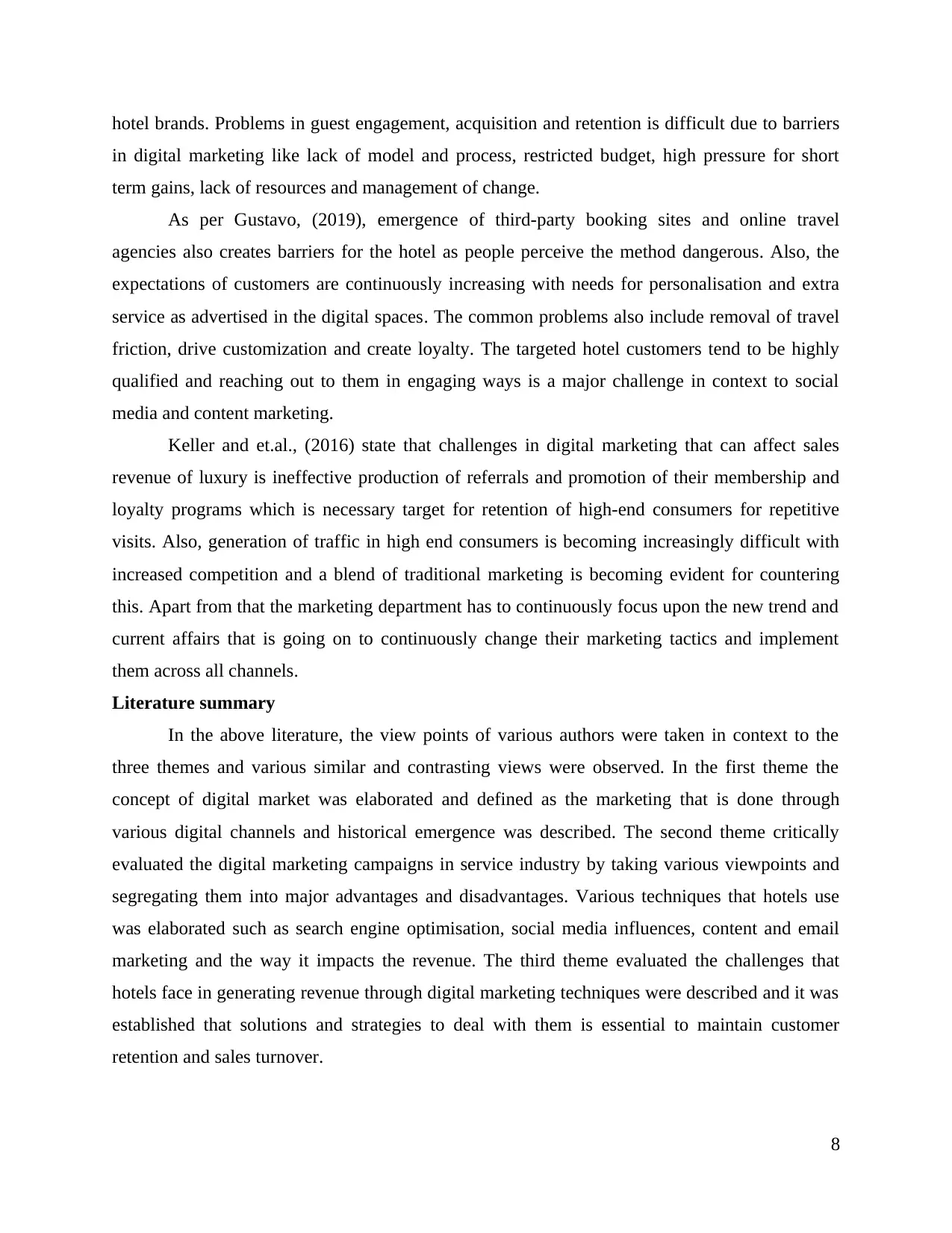
hotel brands. Problems in guest engagement, acquisition and retention is difficult due to barriers
in digital marketing like lack of model and process, restricted budget, high pressure for short
term gains, lack of resources and management of change.
As per Gustavo, (2019), emergence of third-party booking sites and online travel
agencies also creates barriers for the hotel as people perceive the method dangerous. Also, the
expectations of customers are continuously increasing with needs for personalisation and extra
service as advertised in the digital spaces. The common problems also include removal of travel
friction, drive customization and create loyalty. The targeted hotel customers tend to be highly
qualified and reaching out to them in engaging ways is a major challenge in context to social
media and content marketing.
Keller and et.al., (2016) state that challenges in digital marketing that can affect sales
revenue of luxury is ineffective production of referrals and promotion of their membership and
loyalty programs which is necessary target for retention of high-end consumers for repetitive
visits. Also, generation of traffic in high end consumers is becoming increasingly difficult with
increased competition and a blend of traditional marketing is becoming evident for countering
this. Apart from that the marketing department has to continuously focus upon the new trend and
current affairs that is going on to continuously change their marketing tactics and implement
them across all channels.
Literature summary
In the above literature, the view points of various authors were taken in context to the
three themes and various similar and contrasting views were observed. In the first theme the
concept of digital market was elaborated and defined as the marketing that is done through
various digital channels and historical emergence was described. The second theme critically
evaluated the digital marketing campaigns in service industry by taking various viewpoints and
segregating them into major advantages and disadvantages. Various techniques that hotels use
was elaborated such as search engine optimisation, social media influences, content and email
marketing and the way it impacts the revenue. The third theme evaluated the challenges that
hotels face in generating revenue through digital marketing techniques were described and it was
established that solutions and strategies to deal with them is essential to maintain customer
retention and sales turnover.
8
in digital marketing like lack of model and process, restricted budget, high pressure for short
term gains, lack of resources and management of change.
As per Gustavo, (2019), emergence of third-party booking sites and online travel
agencies also creates barriers for the hotel as people perceive the method dangerous. Also, the
expectations of customers are continuously increasing with needs for personalisation and extra
service as advertised in the digital spaces. The common problems also include removal of travel
friction, drive customization and create loyalty. The targeted hotel customers tend to be highly
qualified and reaching out to them in engaging ways is a major challenge in context to social
media and content marketing.
Keller and et.al., (2016) state that challenges in digital marketing that can affect sales
revenue of luxury is ineffective production of referrals and promotion of their membership and
loyalty programs which is necessary target for retention of high-end consumers for repetitive
visits. Also, generation of traffic in high end consumers is becoming increasingly difficult with
increased competition and a blend of traditional marketing is becoming evident for countering
this. Apart from that the marketing department has to continuously focus upon the new trend and
current affairs that is going on to continuously change their marketing tactics and implement
them across all channels.
Literature summary
In the above literature, the view points of various authors were taken in context to the
three themes and various similar and contrasting views were observed. In the first theme the
concept of digital market was elaborated and defined as the marketing that is done through
various digital channels and historical emergence was described. The second theme critically
evaluated the digital marketing campaigns in service industry by taking various viewpoints and
segregating them into major advantages and disadvantages. Various techniques that hotels use
was elaborated such as search engine optimisation, social media influences, content and email
marketing and the way it impacts the revenue. The third theme evaluated the challenges that
hotels face in generating revenue through digital marketing techniques were described and it was
established that solutions and strategies to deal with them is essential to maintain customer
retention and sales turnover.
8
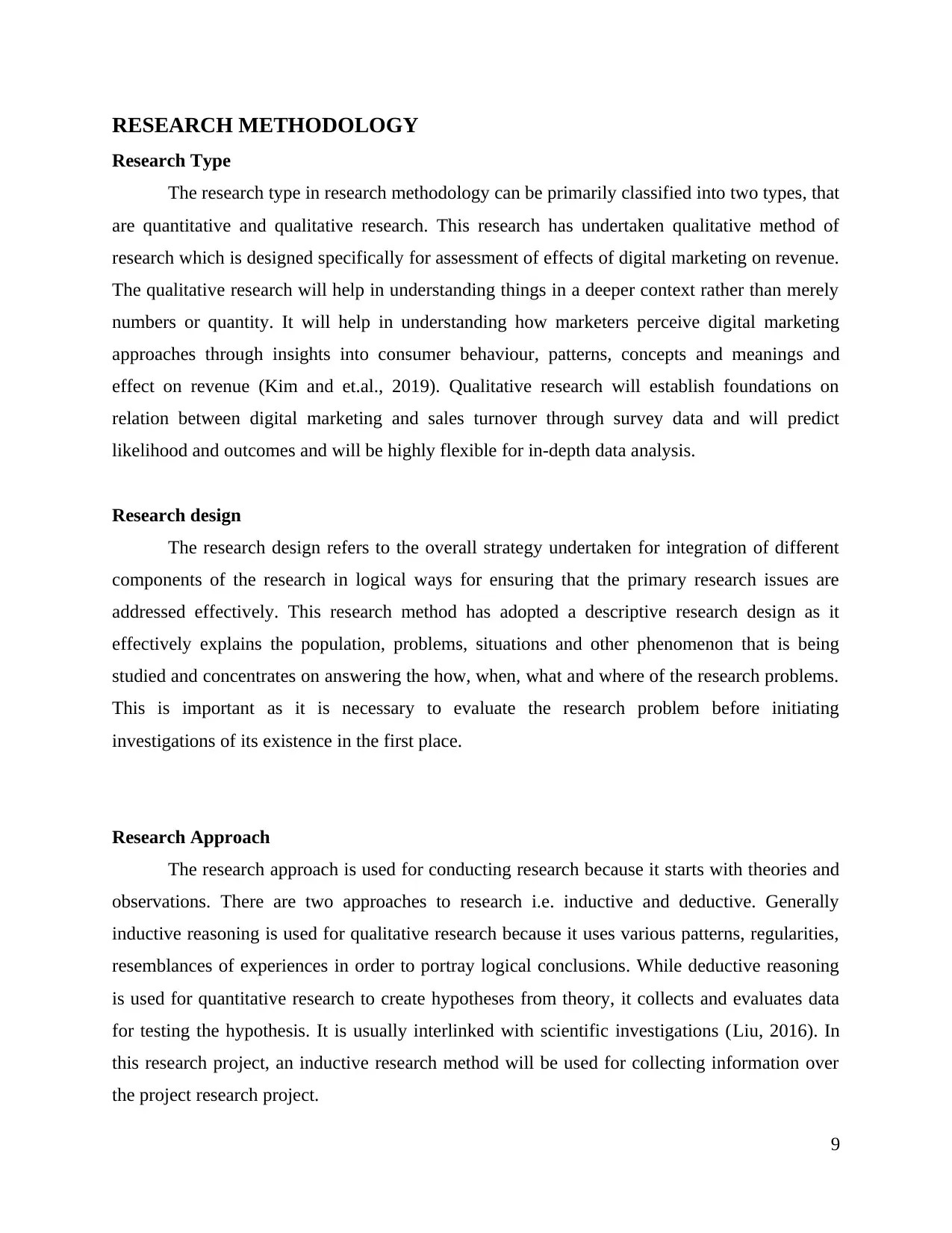
RESEARCH METHODOLOGY
Research Type
The research type in research methodology can be primarily classified into two types, that
are quantitative and qualitative research. This research has undertaken qualitative method of
research which is designed specifically for assessment of effects of digital marketing on revenue.
The qualitative research will help in understanding things in a deeper context rather than merely
numbers or quantity. It will help in understanding how marketers perceive digital marketing
approaches through insights into consumer behaviour, patterns, concepts and meanings and
effect on revenue (Kim and et.al., 2019). Qualitative research will establish foundations on
relation between digital marketing and sales turnover through survey data and will predict
likelihood and outcomes and will be highly flexible for in-depth data analysis.
Research design
The research design refers to the overall strategy undertaken for integration of different
components of the research in logical ways for ensuring that the primary research issues are
addressed effectively. This research method has adopted a descriptive research design as it
effectively explains the population, problems, situations and other phenomenon that is being
studied and concentrates on answering the how, when, what and where of the research problems.
This is important as it is necessary to evaluate the research problem before initiating
investigations of its existence in the first place.
Research Approach
The research approach is used for conducting research because it starts with theories and
observations. There are two approaches to research i.e. inductive and deductive. Generally
inductive reasoning is used for qualitative research because it uses various patterns, regularities,
resemblances of experiences in order to portray logical conclusions. While deductive reasoning
is used for quantitative research to create hypotheses from theory, it collects and evaluates data
for testing the hypothesis. It is usually interlinked with scientific investigations (Liu, 2016). In
this research project, an inductive research method will be used for collecting information over
the project research project.
9
Research Type
The research type in research methodology can be primarily classified into two types, that
are quantitative and qualitative research. This research has undertaken qualitative method of
research which is designed specifically for assessment of effects of digital marketing on revenue.
The qualitative research will help in understanding things in a deeper context rather than merely
numbers or quantity. It will help in understanding how marketers perceive digital marketing
approaches through insights into consumer behaviour, patterns, concepts and meanings and
effect on revenue (Kim and et.al., 2019). Qualitative research will establish foundations on
relation between digital marketing and sales turnover through survey data and will predict
likelihood and outcomes and will be highly flexible for in-depth data analysis.
Research design
The research design refers to the overall strategy undertaken for integration of different
components of the research in logical ways for ensuring that the primary research issues are
addressed effectively. This research method has adopted a descriptive research design as it
effectively explains the population, problems, situations and other phenomenon that is being
studied and concentrates on answering the how, when, what and where of the research problems.
This is important as it is necessary to evaluate the research problem before initiating
investigations of its existence in the first place.
Research Approach
The research approach is used for conducting research because it starts with theories and
observations. There are two approaches to research i.e. inductive and deductive. Generally
inductive reasoning is used for qualitative research because it uses various patterns, regularities,
resemblances of experiences in order to portray logical conclusions. While deductive reasoning
is used for quantitative research to create hypotheses from theory, it collects and evaluates data
for testing the hypothesis. It is usually interlinked with scientific investigations (Liu, 2016). In
this research project, an inductive research method will be used for collecting information over
the project research project.
9
⊘ This is a preview!⊘
Do you want full access?
Subscribe today to unlock all pages.

Trusted by 1+ million students worldwide
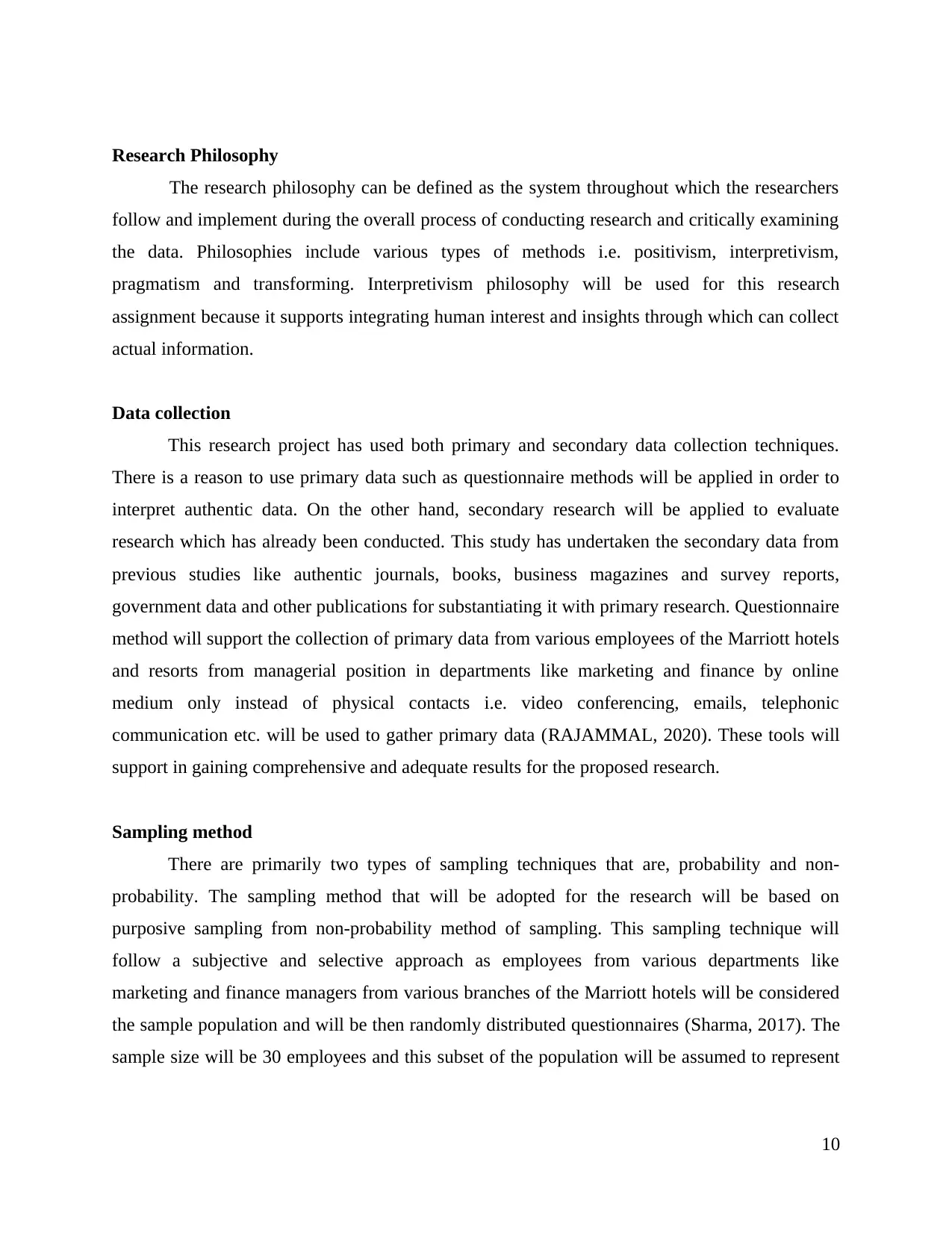
Research Philosophy
The research philosophy can be defined as the system throughout which the researchers
follow and implement during the overall process of conducting research and critically examining
the data. Philosophies include various types of methods i.e. positivism, interpretivism,
pragmatism and transforming. Interpretivism philosophy will be used for this research
assignment because it supports integrating human interest and insights through which can collect
actual information.
Data collection
This research project has used both primary and secondary data collection techniques.
There is a reason to use primary data such as questionnaire methods will be applied in order to
interpret authentic data. On the other hand, secondary research will be applied to evaluate
research which has already been conducted. This study has undertaken the secondary data from
previous studies like authentic journals, books, business magazines and survey reports,
government data and other publications for substantiating it with primary research. Questionnaire
method will support the collection of primary data from various employees of the Marriott hotels
and resorts from managerial position in departments like marketing and finance by online
medium only instead of physical contacts i.e. video conferencing, emails, telephonic
communication etc. will be used to gather primary data (RAJAMMAL, 2020). These tools will
support in gaining comprehensive and adequate results for the proposed research.
Sampling method
There are primarily two types of sampling techniques that are, probability and non-
probability. The sampling method that will be adopted for the research will be based on
purposive sampling from non-probability method of sampling. This sampling technique will
follow a subjective and selective approach as employees from various departments like
marketing and finance managers from various branches of the Marriott hotels will be considered
the sample population and will be then randomly distributed questionnaires (Sharma, 2017). The
sample size will be 30 employees and this subset of the population will be assumed to represent
10
The research philosophy can be defined as the system throughout which the researchers
follow and implement during the overall process of conducting research and critically examining
the data. Philosophies include various types of methods i.e. positivism, interpretivism,
pragmatism and transforming. Interpretivism philosophy will be used for this research
assignment because it supports integrating human interest and insights through which can collect
actual information.
Data collection
This research project has used both primary and secondary data collection techniques.
There is a reason to use primary data such as questionnaire methods will be applied in order to
interpret authentic data. On the other hand, secondary research will be applied to evaluate
research which has already been conducted. This study has undertaken the secondary data from
previous studies like authentic journals, books, business magazines and survey reports,
government data and other publications for substantiating it with primary research. Questionnaire
method will support the collection of primary data from various employees of the Marriott hotels
and resorts from managerial position in departments like marketing and finance by online
medium only instead of physical contacts i.e. video conferencing, emails, telephonic
communication etc. will be used to gather primary data (RAJAMMAL, 2020). These tools will
support in gaining comprehensive and adequate results for the proposed research.
Sampling method
There are primarily two types of sampling techniques that are, probability and non-
probability. The sampling method that will be adopted for the research will be based on
purposive sampling from non-probability method of sampling. This sampling technique will
follow a subjective and selective approach as employees from various departments like
marketing and finance managers from various branches of the Marriott hotels will be considered
the sample population and will be then randomly distributed questionnaires (Sharma, 2017). The
sample size will be 30 employees and this subset of the population will be assumed to represent
10
Paraphrase This Document
Need a fresh take? Get an instant paraphrase of this document with our AI Paraphraser
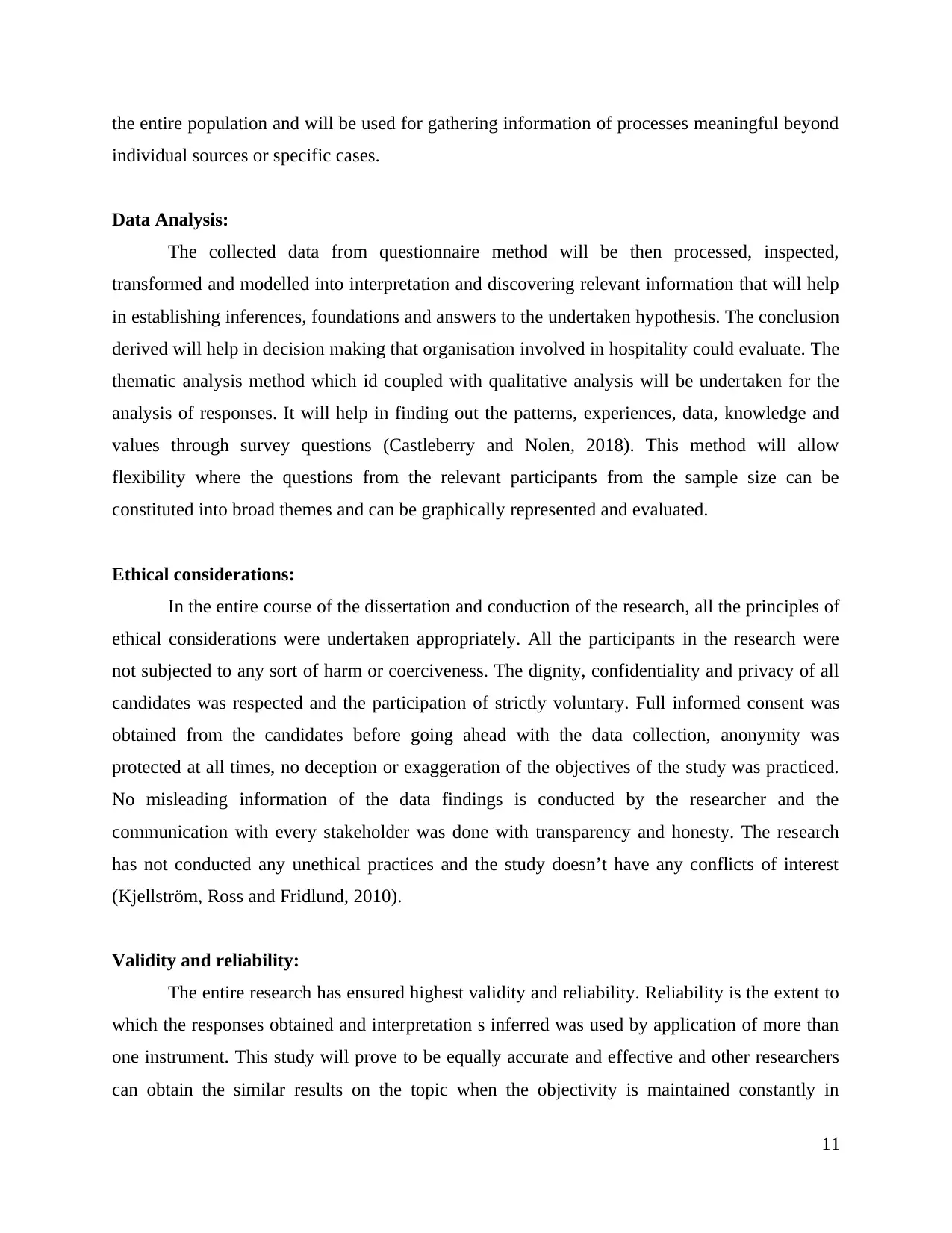
the entire population and will be used for gathering information of processes meaningful beyond
individual sources or specific cases.
Data Analysis:
The collected data from questionnaire method will be then processed, inspected,
transformed and modelled into interpretation and discovering relevant information that will help
in establishing inferences, foundations and answers to the undertaken hypothesis. The conclusion
derived will help in decision making that organisation involved in hospitality could evaluate. The
thematic analysis method which id coupled with qualitative analysis will be undertaken for the
analysis of responses. It will help in finding out the patterns, experiences, data, knowledge and
values through survey questions (Castleberry and Nolen, 2018). This method will allow
flexibility where the questions from the relevant participants from the sample size can be
constituted into broad themes and can be graphically represented and evaluated.
Ethical considerations:
In the entire course of the dissertation and conduction of the research, all the principles of
ethical considerations were undertaken appropriately. All the participants in the research were
not subjected to any sort of harm or coerciveness. The dignity, confidentiality and privacy of all
candidates was respected and the participation of strictly voluntary. Full informed consent was
obtained from the candidates before going ahead with the data collection, anonymity was
protected at all times, no deception or exaggeration of the objectives of the study was practiced.
No misleading information of the data findings is conducted by the researcher and the
communication with every stakeholder was done with transparency and honesty. The research
has not conducted any unethical practices and the study doesn’t have any conflicts of interest
(Kjellström, Ross and Fridlund, 2010).
Validity and reliability:
The entire research has ensured highest validity and reliability. Reliability is the extent to
which the responses obtained and interpretation s inferred was used by application of more than
one instrument. This study will prove to be equally accurate and effective and other researchers
can obtain the similar results on the topic when the objectivity is maintained constantly in
11
individual sources or specific cases.
Data Analysis:
The collected data from questionnaire method will be then processed, inspected,
transformed and modelled into interpretation and discovering relevant information that will help
in establishing inferences, foundations and answers to the undertaken hypothesis. The conclusion
derived will help in decision making that organisation involved in hospitality could evaluate. The
thematic analysis method which id coupled with qualitative analysis will be undertaken for the
analysis of responses. It will help in finding out the patterns, experiences, data, knowledge and
values through survey questions (Castleberry and Nolen, 2018). This method will allow
flexibility where the questions from the relevant participants from the sample size can be
constituted into broad themes and can be graphically represented and evaluated.
Ethical considerations:
In the entire course of the dissertation and conduction of the research, all the principles of
ethical considerations were undertaken appropriately. All the participants in the research were
not subjected to any sort of harm or coerciveness. The dignity, confidentiality and privacy of all
candidates was respected and the participation of strictly voluntary. Full informed consent was
obtained from the candidates before going ahead with the data collection, anonymity was
protected at all times, no deception or exaggeration of the objectives of the study was practiced.
No misleading information of the data findings is conducted by the researcher and the
communication with every stakeholder was done with transparency and honesty. The research
has not conducted any unethical practices and the study doesn’t have any conflicts of interest
(Kjellström, Ross and Fridlund, 2010).
Validity and reliability:
The entire research has ensured highest validity and reliability. Reliability is the extent to
which the responses obtained and interpretation s inferred was used by application of more than
one instrument. This study will prove to be equally accurate and effective and other researchers
can obtain the similar results on the topic when the objectivity is maintained constantly in
11
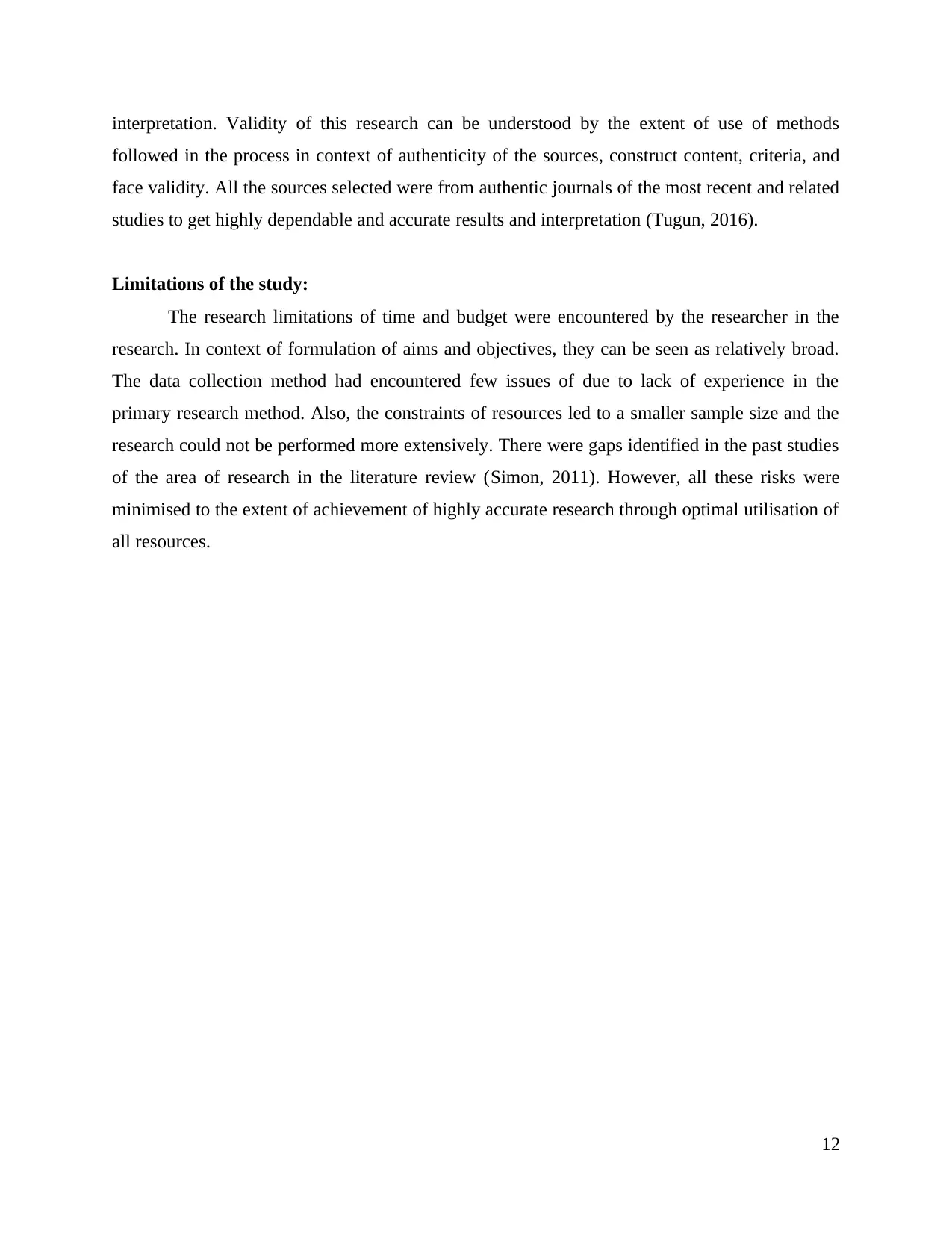
interpretation. Validity of this research can be understood by the extent of use of methods
followed in the process in context of authenticity of the sources, construct content, criteria, and
face validity. All the sources selected were from authentic journals of the most recent and related
studies to get highly dependable and accurate results and interpretation (Tugun, 2016).
Limitations of the study:
The research limitations of time and budget were encountered by the researcher in the
research. In context of formulation of aims and objectives, they can be seen as relatively broad.
The data collection method had encountered few issues of due to lack of experience in the
primary research method. Also, the constraints of resources led to a smaller sample size and the
research could not be performed more extensively. There were gaps identified in the past studies
of the area of research in the literature review (Simon, 2011). However, all these risks were
minimised to the extent of achievement of highly accurate research through optimal utilisation of
all resources.
12
followed in the process in context of authenticity of the sources, construct content, criteria, and
face validity. All the sources selected were from authentic journals of the most recent and related
studies to get highly dependable and accurate results and interpretation (Tugun, 2016).
Limitations of the study:
The research limitations of time and budget were encountered by the researcher in the
research. In context of formulation of aims and objectives, they can be seen as relatively broad.
The data collection method had encountered few issues of due to lack of experience in the
primary research method. Also, the constraints of resources led to a smaller sample size and the
research could not be performed more extensively. There were gaps identified in the past studies
of the area of research in the literature review (Simon, 2011). However, all these risks were
minimised to the extent of achievement of highly accurate research through optimal utilisation of
all resources.
12
⊘ This is a preview!⊘
Do you want full access?
Subscribe today to unlock all pages.

Trusted by 1+ million students worldwide
1 out of 34
Related Documents
Your All-in-One AI-Powered Toolkit for Academic Success.
+13062052269
info@desklib.com
Available 24*7 on WhatsApp / Email
![[object Object]](/_next/static/media/star-bottom.7253800d.svg)
Unlock your academic potential
Copyright © 2020–2026 A2Z Services. All Rights Reserved. Developed and managed by ZUCOL.





